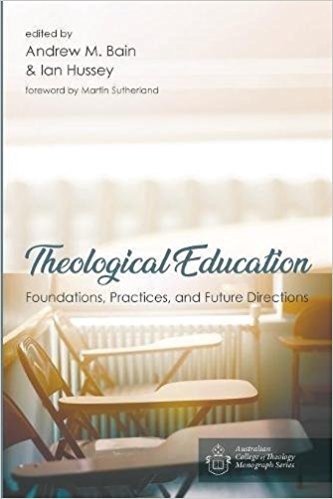
Theological Education: Foundations, Practices, and Future Directions
Date Reviewed: October 1, 2018
This edited volume of 21 articles explores the biblical and theological perspectives, historical foundations, current practices, and future directions of theological education in Australia and was published as part of the Australian College of Theology Monograph Series. The authors represent a wide array of theological disciplines including church history, Old Testament, New Testament, pastoral studies, Christian education, evangelism, spirituality, and theology. In addition to their academic disciplines, the authors come from a variety of backgrounds including adjunct faculty, faculty, administrators from academic intuitions and from the Australian and New Zealand Association of Theological Schools, as well as pastors mainly from evangelical perspectives.
Building upon the concept that the church follows where theological education leads, the editors of this volume, Bain and Hussey, argue in their introduction that “theological education is too important a task to be done without careful and ongoing thought. The imperative to be reflective about how we go about our task as theological educator is amplified dramatically by the changing world in which we live” (xix). This volume attempts to survey this current reflection on theological education in the Australian context.
The first section of this volume, Biblical and Theological Perspectives, offers three chapters that explore how the ontological view of the centers of theological education impact their praxis. These three chapters represent one of the most insightful parts of this book as the three authors all successfully explore how theological assumptions and perspectives shape how theological education has and is happening in Australia. Barker explains “I offer my reflections on how an evangelical understanding of what we are teaching should shape how we teach it” (4). Many of these same concepts emerge in Starling’s article, “The Scribe, the Steward, and the Inhabiting Word,” where Starling asks how these three metaphors “inform the way in which we seek to shape the curriculum for theological education in our own time and the institutions within which we teach it?” (25).
In the second section, Historical Perspectives, six articles explore the historical foundations of theological education in Australia. These chapters examine a variety of themes including theological education in early Christianity, models of western theological education, the impact of American theological education (especially the recently closed Andover Theological seminary), as well as Australian specific chapters with histories of the Australian College of Theology and Sydney Missionary and Bible College.
The third and largest section of this book, Current Practices, provides nine articles that examine a variety of current perspectives and groups within Australian theological education including: women, the Chinese immigrants, missional approaches, spiritual formation, attrition, cross-culture ministry, and an empirical exploration of who is currently engaged in theological education.
The final section, Future Directions, offers three articles that explore future directions of theological education in the Australian context. Although these three authors provide solid chapters on telecommuting staff and challenges for theological education, this is the weakest section of this volume. After providing a broad foundation with historical perspective and current practices, the future directions lack the visionary perspectives of the rest of the book. It would have been wonderful if this section could have been expanded to examine many of the challenges identified in the Current Practices section.
This title provides a valuable piece to the puzzle of theological education around the globe. Theological education is a complex endeavor and through the contextualization of various methods and historical models to it, the challenge of theological education can be addressed with wit and wisdom. This is an important volume and should be added to the collection of major theological libraries and institutions that explore the history of religion and/or approaches to theological education.